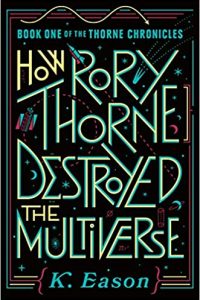Paul Di Filippo Reviews Galaxias by Stephen Baxter
 Galaxias, Stephen Baxter (Gollancz 978-1473228863, trade paperback, 544pp, $22.84) October 2021.
Galaxias, Stephen Baxter (Gollancz 978-1473228863, trade paperback, 544pp, $22.84) October 2021.
Stephen Baxter’s latest novel is a mind-expanding trip into an unpredictable but scientifically rigorous future—in other words, one of his patented Hard SF wonderworks. But much as I enjoyed it, my reading pleasures only bloomed after I had dashed some of my perhaps not-unwarranted expectations. I was ready to read Wylie and Balmer’s When Worlds Collide, and I got Aldiss’s Greybeard instead. Now, please note that Greybeard is one of my top 50 SF favorites, so this comparison is not a knock. It’s only that the book’s opener primed me for something much different.
The first few punchy hard-hitting chapters, occurring in 2057, introduce us to our main protagonist, Tash Brand, a UK governmental worker at a fairly high level. On her way home from her job one afternoon, the sun winks out. It’s gone completely from the sky—and, as we learn, from its place at the center of the solar system. This condition lasts twenty-four hours, with concurrent consternation and growing panic. And then the sun is restored.
Let’s pause here for a moment before delving into the aftermath of this startlement. Given Baxter’s reputation for Cosmic Grandeur, one expects the rest of the book to rapidly cascade into the kind of titanic events resonant with other similar paradigm-shattering SF. I’m thinking of Robert Charles Wilson’s Spin series, or Greg Bear’s duology The Forge of God and Anvil of Stars (whose theme, we discover, echoes Baxter’s) or Neal Stephenson’s Seveneves. But we soon apprehend that this is not Baxter’s plan. He intends to stay Earthbound and rather low-key, moving ahead with his tale slowly and in a philosophical vein. Not that we don’t get lots of action and shocking developments and even some gosh-wow stefnal goodies. Baxter could not write a book without those virtues. But his focus here is on how such a catastrophe impacts a set of representative individuals and how mankind in general would respond and how cultures could possibly adapt to such a wild occurrence.
The first 100 pages or so is devoted to that twenty-four hours without a sun: the “Blink.” By the middle of the book, we have witnessed a year in the life of the post-Blink globe. The second half of the book spans the next twelve years. And a little coda supplies the requisite and satisfying far-future denouement. There are lots of government conferences and meetings, lots of R&D and scientific responses to the plight; lots of savvy theorizing, and lots of interpersonal drama, some of which even happens in such exotic venues as the Moon, the Kuiper Belt and Mercury. But Benford’s Galactic Center Saga this is not. As I tried to indicate with my very approximate parallel, this is a melancholy, emotional, life-affirming tale of how to adjust to harsh new realities, akin to Greybeard.
Baxter succeeds in hooking the reader by focusing on the very relatable Tash Brand and her two undying chums from college, Mel and Zhi. Zhi is an astronaut and Mel is assistant to the Astronomer Royal, Charlie Marlowe, herself a keenly drawn individual. When you add in Tash’s boss, the government minister Fred Bowles; Mel’s contrarian daughter Jane; a hard-nosed bodyguard named Grace; Zhi’s famous mother, Yan, one of China’s top scientists; Elon-Musk-style space entrepreneur Serena Jones; and a host of others, you get one of those broad-spectrum thriller-style casts (The Towering Inferno, The Poseidon Adventure, et al) that encourages a wealth of viewpoints on the universal dilemma.
That dilemma eventually manifests as this. The sun was shifted by a hypothesized but quite likely-to-exist entity dubbed Galaxias (a great Marvel villain name!). Being the sole Kardashev-III inhabitant of the Milky Way, Galaxias has the habit of putting down any civilizations with even the slightest potential to rival his reign (thus explaining the Fermi Paradox neatly). The sun-abduction (and generous restoration) was humanity’s first warning shot to tamp down their interstellar ambitions. (Baxter’s book thus joins the roster of titles that posit deadly responses to mankind’s sheer existence, such as Pellegrino and Zebrowski’s The Killing Star.)
All this leads to a two-track plot. First comes how humanity deals with the physical fallout of the Blink. That twenty-four hours without the sun’s stabilizing gravity and heat has triggered earthquakes, weather changes, and a host of other potentially fatal phenomena. Even the length of our year has been altered, as has the Moon’s relation to our planet. Baxter is unrelenting in his depictions of such events as the immolation of Naples, conveying humanity’s resilience and fortitude.
The second track is how to respond to the challenge from Galaxias. The Western coalition decides on a near-term starship in-your-face assault, while the Chinese embark on a much more subtle, long-range and highly ambitious plan, whose surprise I won’t spoil. Suffice it to say that it’s sufficiently mind-boggling.
And throughout the large-scale chaos the quotidian human dramas are enacted in a very capable and empathetic fashion, showing us, as Tash affirms, that friendship and communal activities—Galaxias, as a unique and lonely individual, cannot share these qualities—are the foundation upon which all higher achievements are built.
In this book, Baxter has reined in a bit his Edmond Hamilton “World Wrecker” tendencies to focus more on his George Stewart Earth Abides side. It’s a nice lateral move that results in a great tale where a deliberately limited scope intensifies one valuable dimension.
 While you are here, please take a moment to support Locus with a one-time or recurring donation. We rely on reader donations to keep the magazine and site going, and would like to keep the site paywall free, but WE NEED YOUR FINANCIAL SUPPORT to continue quality coverage of the science fiction and fantasy field.
While you are here, please take a moment to support Locus with a one-time or recurring donation. We rely on reader donations to keep the magazine and site going, and would like to keep the site paywall free, but WE NEED YOUR FINANCIAL SUPPORT to continue quality coverage of the science fiction and fantasy field.
©Locus Magazine. Copyrighted material may not be republished without permission of LSFF.







